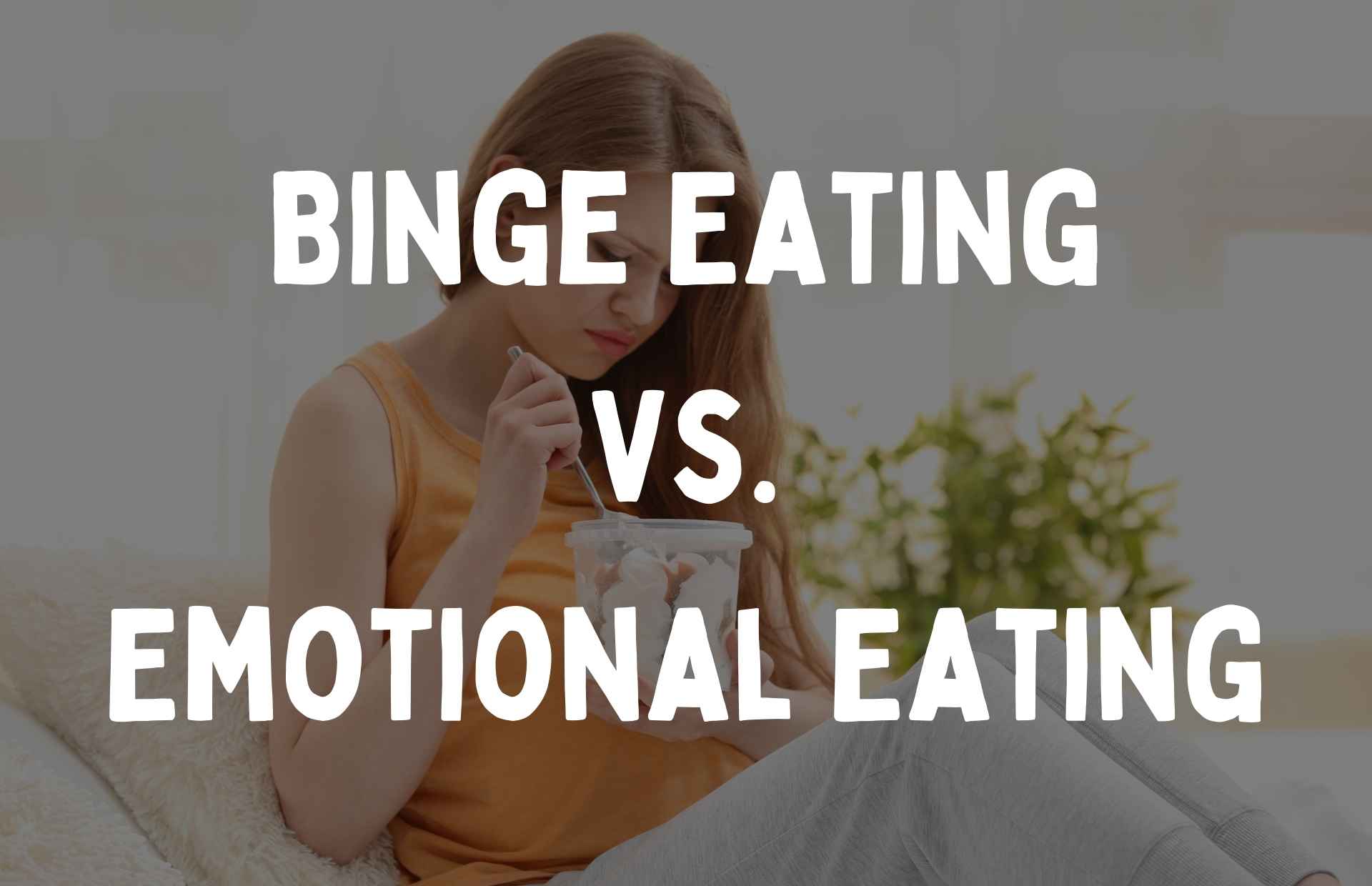

Binge Eating vs. Emotional Eating
We?ve all been there: a rough day at work, followed by a spontaneous craving for pizza, and before you know it, you?re sitting with an empty box wondering how you ate eight slices. (No judgment?sometimes, life just calls for pizza!)
But here?s the thing: are you eating because you?re hungry or because you?re feeling stressed, sad, or even bored? That?s where binge eating and emotional eating come into play.
While these two eating patterns are often lumped together, they?re not the same. Understanding the differences between them can help us develop healthier relationships with food?and yes, still enjoy the occasional pizza slice or ice cream binge without guilt.
What Is Binge Eating?
Let?s start with binge eating, a term you?ve likely heard thrown around quite a bit. Binge eating is more than just an extra-large meal or indulging in a few snacks late at night. It?s a pattern of consuming an excessive amount of food in a short period, often to the point of physical discomfort. Unlike overeating at a holiday dinner (who hasn?t been there?), binge eating tends to occur frequently and is often accompanied by a sense of loss of control.
Key Characteristics of Binge Eating:
Some key characteristics of binge eating include...
- Large quantity of food: More than what most people would consume in a similar time frame.
- Loss of control: Feeling powerless to stop eating, even when full.
- Emotional distress: Binge eating is often followed by feelings of guilt, shame, or disgust.
Binge eating is also linked to Binge Eating Disorder (BED), which is recognised as a mental health condition. Those who struggle with BED often experience frequent episodes of binge eating, which can impact both their physical and mental health.
Personal Note:
I personally struggled with binge eating for years, and I remember how overwhelming it was. I had a terrible relationship with food and often tried to be overly-healthy; which led to all-out crazy binge sessions.
I'd be 'good' all week, and then would have a stressful day at uni or work ... and the next thing I knew, I'd devoured a packet of chips and an entire box of cookies. The sense of guilt I felt afterwards would only lead to more bingeing?it was a tough cycle to break.
Fast forward to today and I've helped myself and hundreds of other women to stop binge eating and build a healthier relationship with food.
I say this to show you that I understand binge and emotional eating better than most people.

What Is Emotional Eating?
Now, let?s talk about emotional eating. If binge eating is about losing control, emotional eating is about soothing emotions. When you?re emotionally eating, food becomes your go-to for coping with negative feelings?stress, loneliness, sadness, you name it. The thing is, you?re not really hungry. Instead, you?re feeding an emotional need.
Emotional Eating Triggers:
Common emotional triggers include...
- Stress: Deadlines, bills, or just a bad day can lead to emotional eating.
- Sadness: Sometimes food feels like the best comfort, even if it?s temporary.
- Boredom: When there?s nothing to do, food suddenly becomes entertainment.
Unlike binge eating, emotional eating doesn?t necessarily involve consuming large amounts of food, and it?s more about eating to feel better rather than because your body needs it.
I?ve been guilty of emotional eating more times than I?d like to admit. There?s something about a big pizza that feels like a big, warm hug on a bad day. But I started to notice a pattern: whenever work was overwhelming, I?d head straight for snacks. It wasn?t because I was hungry ? I just wanted a distraction or comfort.
Finding healthier coping mechanisms to deal with stress and certain emotions helped me overcome this pattern.
Key Differences Between Binge Eating and Emotional Eating
So, how do you tell the difference between binge eating and emotional eating? The lines can get blurry, but here are some key points:
- Amount of food: Binge eating involves eating large amounts of food in one sitting, whereas emotional eating might be smaller amounts, but still unnecessary.
- Frequency: Binge eating is often frequent and can lead to a cycle of guilt and more bingeing, while emotional eating can be more occasional, tied directly to specific emotions or events.
- Loss of control: People who binge eat often feel like they can?t stop once they start. Emotional eating, on the other hand, is more about the choice to eat in response to feelings, though it can sometimes spiral into mindless eating.
The Mental Health Impact Of Binge And Emotional Eating
Both binge eating and emotional eating can have significant effects on mental health. Emotional eating might seem harmless (after all, who hasn?t eaten a slice of cake to cheer up?), but over time, relying on food to cope with emotions can create a disconnection between hunger and actual feelings. You start to lose sight of why you?re eating and how much you?re consuming.
Binge eating is more serious and often leads to a harmful cycle of shame and guilt. This cycle can contribute to depression, anxiety, and low self-esteem. The lack of control during binge episodes leaves many feeling hopeless, which can worsen existing mental health conditions.

Breaking the Cycle
The good news? Both emotional eating and binge eating can be managed. It?s not easy, but with the right tools and support, you can break free from unhealthy eating patterns.
Strategies to Help:
I've found that the most effective and simple to implement strategies to stop binge and emotional eating include...
- Mindful eating: This practice can help you reconnect with your body?s hunger cues. Taking the time to eat slowly and savour your food can make a huge difference. Here is a great guide on mindful eating.
- Healthy coping mechanisms: Finding new ways to manage stress and emotions (exercise, journaling, or simply talking to a friend) can reduce the urge to turn to food for comfort.
- Work with a dietician or nutritionist: Working with an expert who specialises in binge eating is easily the quickest and most effective way to get on top of the issue and build a healthy relationship with food. In the Undiet Program, you spend 12 weeks working closely with a dietician who specialises in binge eating. We believe that it's the most effective binge and emotional eating recovery program in the world.
The Dangers of Not Addressing These Habits
Ignoring emotional or binge eating patterns can lead to more than just weight gain. Over time, these behaviours can harm your relationship with food, making it harder to eat intuitively and nourish your body. Binge eating, in particular, is linked to a higher risk of developing serious health problems like heart disease, diabetes, and high blood pressure.
If left unchecked, emotional and binge eating can also worsen mental health, creating a vicious cycle of negative emotions and unhealthy eating patterns.
The Link Between Mindful Eating and Binge Eating Recovery
One way to break free from the clutches of binge and emotional eating is by practising mindful eating. Mindful eating encourages you to focus on the present moment and pay attention to the food you?re eating?its taste, texture, and how it makes you feel. By slowing down and engaging with your meal, you?re more likely to recognise when you?re full and less likely to eat out of boredom or emotion.
Many people who have struggled with binge eating find that mindful eating helps them regain control. It shifts the focus from mindlessly consuming food to appreciating the act of eating. Over time, this practice can help rebuild a healthy relationship with food.

How Emotional Eating Can Lead to Overeating
Let?s face it: emotional eating rarely stops at a handful of chips. When you?re eating to cope with feelings, it?s easy to overdo it. Emotional eating can quickly turn into overeating, especially if it becomes a habitual response to stress or sadness. When you aren?t eating in response to actual hunger, it?s harder to stop when you?re full?because your body wasn?t craving food in the first place.
Over time, this can lead to weight gain, low self-esteem, and even a full-blown binge eating pattern.
How Emotional Eating Can Lead to Binge Eating
Emotional eating, while sometimes more moderate than binge eating, can act as a gateway to binge eating behaviours. If you frequently use food to manage emotions, the act of eating can become a default response to stress or sadness. Over time, emotional eating can escalate into full-on binge episodes, where larger and larger quantities of food are consumed in one sitting.
Think about it this way: emotional eating is like opening the door to using food as an emotional crutch. If the stress or sadness becomes overwhelming, the desire to feel better can lead to a loss of control and bingeing. This is where the two behaviours start to blur together.
It?s important to recognise emotional eating early on and develop healthier coping mechanisms before it spirals into something more destructive like binge eating.
Why Both Need to Be Addressed
Emotional and binge eating aren?t just about food?they?re about the relationship between food, emotions, and mental health. When left unchecked, both can lead to negative health outcomes, both physically and mentally.
- Physical health risks: Constant overeating can contribute to weight gain, which can increase the risk of chronic conditions such as heart disease, diabetes, and high blood pressure.
- Mental health risks: The guilt, shame, and low self-esteem that often accompany emotional and binge eating can worsen mental health conditions like anxiety and depression.
Addressing these patterns early on through mindful eating, seeing an expert, or other strategies can prevent them from developing into larger issues that impact your overall well-being.

My Personal Take on the Journey
Speaking from experience, dealing with emotional eating isn?t easy. I remember when I first realised that I was reaching for snacks not because I was hungry but because I was stressed. That?s when I began to experiment with all kinds of strategies to uncover what was really going on beneath the surface. It wasn?t about the food?it was about what I was feeling.
I even went to university to study nutrition because I was so passionate about this area and wanted to help others with eating disorders. And after helping hundreds of other women stop bingeing, I can say with confidence that it?s possible to develop a healthier relationship with food. And no, that doesn?t mean giving up pizza or chocolate!
Wrapping It Up
When it comes to the battle of binge eating vs. emotional eating, it?s clear that while they?re different, they?re closely related. Emotional eating can often lead to binge eating, and both can impact your physical and mental health if left unaddressed.
The key takeaway? Becoming aware of your eating habits, and learning to recognise when you?re using food to cope with emotions, is the first step to breaking the cycle. Whether it?s through mindful eating, therapy, or finding new ways to manage stress, there?s always a way to regain control and rebuild a healthier relationship with food.